26 November, 2019
After the day's plenary sessions, IPEN held a well-attended side event on "Mercury Contaminated Sites: guidance, finance and the challenges of ASGM sites." Panelists (IPEN Mercury Policy Advisor Lee Bell; Yuyun Ismawati (Nexus3, Indonesia, and IPEN Lead on ASGM); and Griffins Ochieng (CEJAD, Kenya)) shared information about the reasons that urgent action on contaminated sites is required, the global scale of the problem, sources of contaminated sites, cases of ASGM hotspots in Kenya, economic losses due to mercury, and more. IPEN Heavy Metals Working Group Co-Chair and Director of CREPD (Cameroon), Dr. Gilbert Kuepouo, facilitated the event. Additionally, Arturo Gavilan (Director ofResearch On Contaminants, Wastes And Biosafety, National Institute Of Ecology, Mexican Ministry Of Environment And Natural Resources of Mexico) and Dr. Rocío Millán Gómez from the Environment Department of the Ministerio de Ciencia, Innovación y Universidades' Soil Conservation and Recuperation Research Unit (S pain), spoke from the floor about their personal experiences related to remediation of mercury contaminated sites.
pain), spoke from the floor about their personal experiences related to remediation of mercury contaminated sites.
See the presentations here
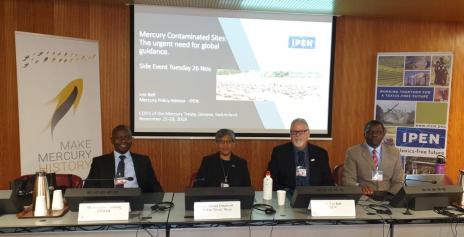
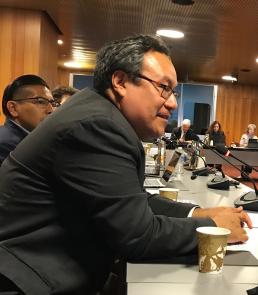
25 November, 2019
IPEN will be delivering interventions on various subjects throughout the COP3 meeting- you can find them on this page. Early IPEN interventions focused on effectiveness evaluation, the amalgam amendment to Annex A, and mercury waste definitions.
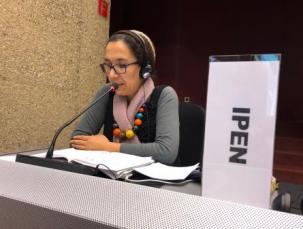
25 November, 2019
Today the Mercury Treaty COP3 began. Mr. Koichiro Matsunaga, Minamata Disease Patient, addressed the delegates in plenary during the opening session. In a moving statement, Mr. Matsunaga, who was exposed to mercury in the womb, reminded delegates of the real-life implications of mercury poisoning. Born in 1963, Mr. Matsunaga could not walk until 7 years old due to Minamata Disease. Despite his disabilities, he enjoyed riding bicycles, but in 2010, it became difficult for him to walk because of increasing pain, which forced him to live in a wheelchair. He stated, "Minamata disease is not over yet. Problems have not been solved yet. I do not want to see any more children suffer like us." He implored delegates: "Please take appropriate control of mercury for future children. I need the whole world to avoid causing any more tragedy by mercury."
Read Mr. Matsunaga's statement in this document
See him addressing plenary in this video
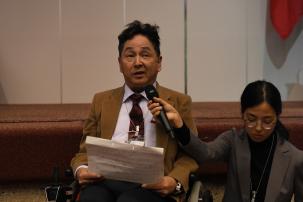
23 November, 2019
Today IPEN held a preparatory meeting in Geneva to prepare for the week ahead. IPEN Heavy Metals Working Group Co-Chair Gilbert Kuepouo (CREPD, Cameroon) and IPEN Mercury Policy Advisor Lee Bell chaired the meeting, which addressed updates since the COP2 meeting last year, as well as the schedule for the COP3. The COP3 begins on 25 November, after technical briefings on 24 November.
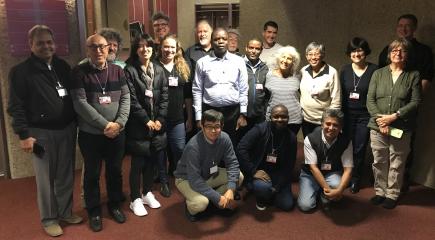
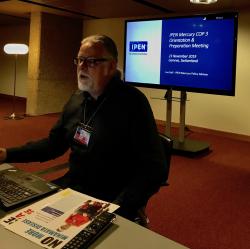
20 November, 2019
IPEN will host a side event on 26 November in Geneva entitled: "Mercury Contaminated Sites: guidance, finance and the challenges of ASGM sites." IPEN Mercury Policy Advisor Lee Bell will be joined by Yuyun Ismawati (Nexus3, Indonesia, and IPEN Lead on ASGM) and Griffins Ochieng (CEJAD, Kenya) to talk about the opportunities and challenges presented by mercury-contaminated sites and the importance of addressing them to address global mercury pollution. See the flyer here.
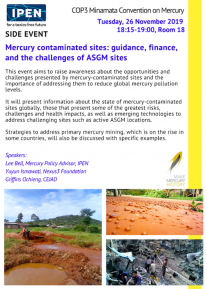
19 November, 2019
Mercury waste thresholds and definitions will be key issues for COP3 as they will define what ‘mercury waste’ is under the treaty and what waste will therefore be subject to Convention requirements. If threshold concentrations are set high, large quantities of mercury waste will escape sound management.
IPEN believes that concentrations should be set at a maximum of 1 mg/kg in order to be health and environment protective.
Learn why, as well as what types of mercury waste should be subject to threshold concentrations, in IPEN’s brief here.
17 November, 2019
The Conference of the Parties (COP) is required to review annexes A and B no later than five years after the date of entry into force of the Convention. A draft decision at COP3 will propose to establish an ad hoc group of experts made up of 20 party representatives and 10 observers nominated from NGO and other organizations. This group will review Annex A and B and consider any submissions from parties to change the annexes. IPEN supports the establishment of the expert committee and the review process.
Amendment to Annex A: The African Region is proposing to move dental amalgam from Part II to Part I of Annex A, which would effectively move dental amalgam from a long term ‘phase-down’ to a short term ‘phase-out’ by 2021. IPEN supports the adoption of the African regional proposal at COP 3.
Amendment to Annex B: The ancient process of “fire gilding” was used to impart a thin gold plating to lower-value metals by mixing a blend of gold powder with elemental mercury and applying the paste to the object. The object would then be “fired” by placing it in a fire or extremely hot oven or kiln where the mercury vaporized, leaving a bright gold plating on the object, but also potentially a significant exposure issue for workers and the public near plating facilities. IPEN supports the addition of fire gilding/mercury gold plating to Annex B of the mercury treaty as soon as possible to reduce the massive emissions and releases caused by this process.
For more details about these points, read the entire brief here.
16 November, 2019
Decision MC-2/8 on Contaminated Sites invites parties to continue to comment on the guidance being developed for adoption at COP3 during the intersessional period. There has been extensive comment and revision of the guidance from the expert group, parties, and more. There is an urgency to adopt the guidance in order to allow many developing countries, especially those with ASGM activity, to take action to address contaminated sites to prevent exposure of populations and ecosystems to this toxic metal.
Parties should adopt the guidance at COP3!
Read the entire brief here.
15 November, 2019
Accompanying IPEN document: Frequently Asked Questions about Mercury Contaminated Sites
8 November, 2019
This document presents IPEN's views about some issues that will be addressed at the 3rd Conference of the Parties, including open burning, effectiveness evaluation, review of Annexes A & B, waste thresholds, contaminated sites, and more.
7 November, 2019
The Mercury Treaty's 3rd Conference of the Parties will be taking place 25 - 29 November, 2019 in Geneva, Swtizerland. Please check back soon for information about IPEN's participation in the conference.


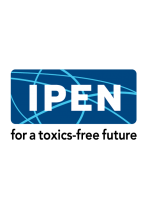

 pain), spoke from the floor about their personal experiences related to remediation of mercury contaminated sites.
pain), spoke from the floor about their personal experiences related to remediation of mercury contaminated sites.






